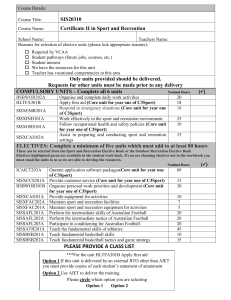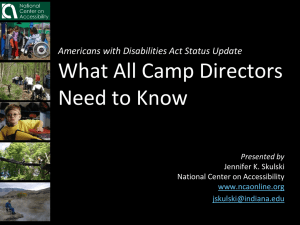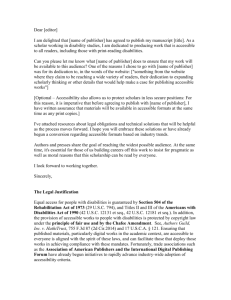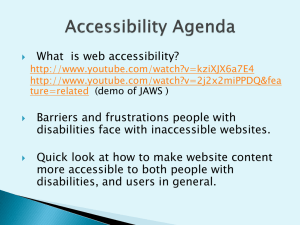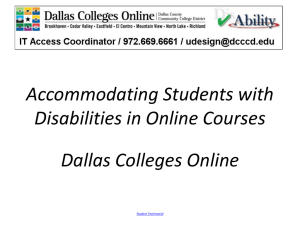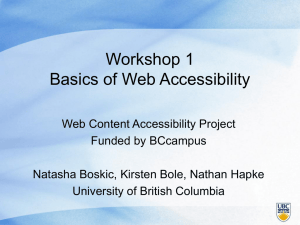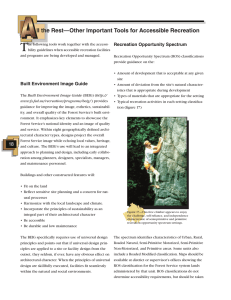Matrix - FIU Global Learning
advertisement
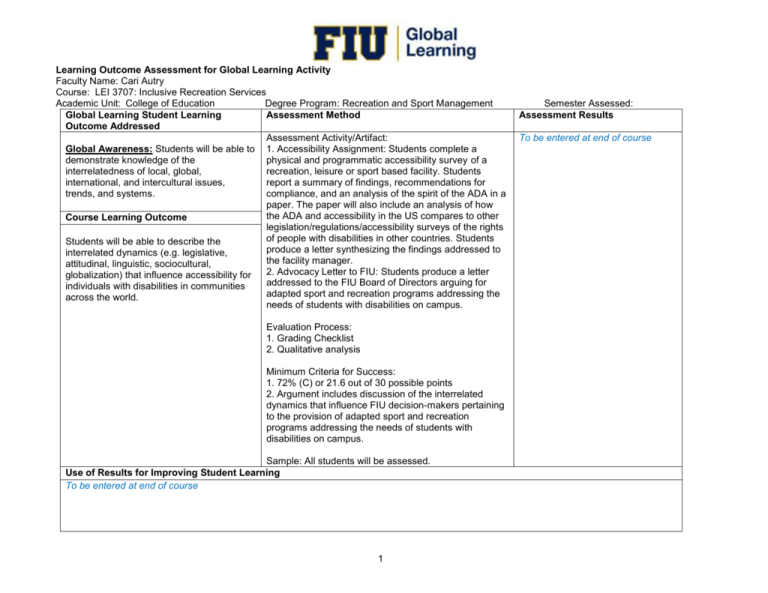
Learning Outcome Assessment for Global Learning Activity Faculty Name: Cari Autry Course: LEI 3707: Inclusive Recreation Services Academic Unit: College of Education Degree Program: Recreation and Sport Management Global Learning Student Learning Assessment Method Outcome Addressed Assessment Activity/Artifact: Global Awareness: Students will be able to 1. Accessibility Assignment: Students complete a demonstrate knowledge of the physical and programmatic accessibility survey of a interrelatedness of local, global, recreation, leisure or sport based facility. Students international, and intercultural issues, report a summary of findings, recommendations for trends, and systems. compliance, and an analysis of the spirit of the ADA in a paper. The paper will also include an analysis of how the ADA and accessibility in the US compares to other Course Learning Outcome legislation/regulations/accessibility surveys of the rights of people with disabilities in other countries. Students Students will be able to describe the produce a letter synthesizing the findings addressed to interrelated dynamics (e.g. legislative, the facility manager. attitudinal, linguistic, sociocultural, 2. Advocacy Letter to FIU: Students produce a letter globalization) that influence accessibility for addressed to the FIU Board of Directors arguing for individuals with disabilities in communities adapted sport and recreation programs addressing the across the world. needs of students with disabilities on campus. Evaluation Process: 1. Grading Checklist 2. Qualitative analysis Minimum Criteria for Success: 1. 72% (C) or 21.6 out of 30 possible points 2. Argument includes discussion of the interrelated dynamics that influence FIU decision-makers pertaining to the provision of adapted sport and recreation programs addressing the needs of students with disabilities on campus. Sample: All students will be assessed. Use of Results for Improving Student Learning To be entered at end of course 1 Semester Assessed: Assessment Results To be entered at end of course Learning Outcome Assessment for Global Learning Activity Faculty Name: Cari Autry Course: LEI 3707: Inclusive Recreation Services Academic Unit: College of Education Degree Program: Recreation and Sport Management Global Learning Student Learning Assessment Method Outcome Addressed Global Perspective: Students will be able to conduct a multi-perspective analysis of local, global, international, and intercultural problems. Course Learning Outcome Students will be able to conduct a multiperspective analysis (locally and internationally) of physical and programmatic accessibility for people with disabilities within the context of recreation, leisure and sport facilities. Assessment Activity/Artifact: 1. Accessibility Assignment: Students will analyze how the ADA and accessibility in the US compares to other legislation/regulations/accessibility surveys of the rights of people with disabilities in other countries. 2. Wheelchair Simulation: Students utilize a recreational, leisure, or sport facility while using a wheelchair. Students produce a 10-minute video documentary and blog reflecting on the differences between abled and disabled experiences of the facility, their own attitudes, and others’ behaviors during the simulation. Evaluation Process: 1. Grading Checklist 2. 5-point rubric Minimum Criteria for Success: 1. 3 out of 5 points possible for checklist criterion 2. 3 out of 5 points possible on rubric Sample: All students will be assessed. Use of Results for Improving Student Learning To be entered at end of course 2 Semester Assessed: Assessment Results To be entered at end of course Learning Outcome Assessment for Global Learning Activity Faculty Name: Cari Autry Course: LEI 3707: Inclusive Recreation Services Academic Unit: College of Education Degree Program: Recreation and Sport Management Global Learning Student Learning Assessment Method Outcome Addressed Assessment Activity/Artifact: Global Engagement: Students will be able “Responding to Disability: A Question of Attitude” Survey: to demonstrate willingness to engage in Students complete survey and associated readings and local, global, international, and intercultural case study activities at the beginning of the semester. problem solving. Students reflect upon responses and attitude change on discussion board at the end of the semester. Course Learning Outcome Evaluation Process: 2-point rubric Students will be able to demonstrate a willingness to self-evaluate their attitudes and learn strategies for improving others’ pertaining to accessibility for people with disabilities in communities across the world. Minimum Criteria for Success: 1.5 out of 2 points possible Sample: All students will be assessed. Use of Results for Improving Student Learning To be entered at end of course 3 Semester Assessed: Assessment Results To be entered at end of course
